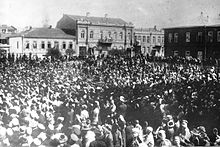History of Batumi
Batumi (Georgian: ბათუმი) is the capital city of Adjara, an autonomous republic in southwest Georgia, located on the eastern coast of the Black Sea.
After the successive Ottoman and British occupations at the end of World War I, Batumi and its region passed to the Democratic Republic of Georgia in 1920.
[2] This Bathys is sometimes identified with Portus altus, possibly a Latin rendition of the locale's Greek name, of the Tabula Peutingeriana, a road map from the Roman period.
The locale was a home to a Roman military fort during the reign of Hadrian (r. 117-138 AD), but was deserted for the fortress of Petra constructed under Justinian I (r. 527–565) on the site of the present-day Tsikhisdziri to the north of Batumi.
The medieval history of Batumi, or Batomi as Georgians called it down to the early 20th century, is unremarkable and the town is scarcely mentioned in the contemporary sources.
Barbaro reports it being one of the two ports of the lord "Bendian" (the other being Sebastopolis, i.e., modern-day Sukhumi), while Contarini describes it as a maritime town centered on a fortress.
The "Bendian" of Barbaro is apparently a corruption of Bediani, the title of the Dadiani princes who governed several western Georgian provinces under the increasingly nominal authority of the kings of Georgia.
After the fragmentation of the Kingdom of Georgia in the late 15th century, the town and district of Batumi passed to the Georgian noble house of Gurieli, Princes of Guria.
The Georgian geographer Prince Vakhushti (1696–1757) describes Batoum as a town with an excellent citadel, while the French consul Adrien Dupré, who visited the area in 1807, reports it being a large village with the population of 2,000 living in the houses scattered along the bay and in the nearby forests.
During the following two decades, the Ottoman government consolidated their hold of the Batoum area by eliminating the power of the Khimshiashvili, a local family of Muslim Georgian beys.
In 1876, a thorough reconnaissance of the area was made by a Georgian scholar and colonel in the Russian service, Prince Giorgi Kazbegi, who left the only general account of the region available at that time.
[4] During the Russo-Turkish War of 1877-1878, the Ottomans had Batoum heavily fortified and successfully resisted the Russian amphibious attempts at capturing the town.
However, an eventual defeat in the war forced the Sublime Porte to cede Batoum and Adjara, among other territories, to the Russian Empire in the Treaty of San Stefano of 3 March 1878.
Finally, on 1 June 1903, with the Okrug of Artvin, it was established as the region (oblast) of Batumi placed under the direct control of the General Government of Georgia.
[7] Early in the 1900s, Batumi became a focus of Social Democratic agitation, leading to a mass strike at the Rothschild oil refinery in March 1902.
[9][10] 12 March: the dead workers are buried triggering a 7,000 strong demonstration surrounded by Cossacks and gendarmes who ban songs and speeches.
On 3 March 1918, now Soviet Russia granted the Muslim population of Batumi, Kars and Ardahan the right of self-determination under the Ottoman suzerainty.
In the context of anarchy spreading in the Caucasus, the Ottoman occupation was relatively well accepted by large parts of the local population, as demonstrated by available testimonies.
On 31 August 1924, the local cell of the anti-Soviet underground organization was destroyed; its leaders, including major general Giorgi Purtseladze (then the chief of staff of the Batum fortifications), were shot.
After the dissolution of the Soviet Union, Aslan Abashidze was appointed head of Adjara's governing council and subsequently held onto power throughout the unrest of the 1990s.
Whilst other regions, such as Abkhazia, attempted to break away from the Georgian state, Adjara maintained an integral part of the Republic's territory.
However, due to a fragile security situation, Abashidze was able to exploit the central government's weaknesses and rule the area as a personal fiefdom.
Since the change of power in Adjara, Batumi has attracted several international investors with real estate prices in the city trebling since 2001.









